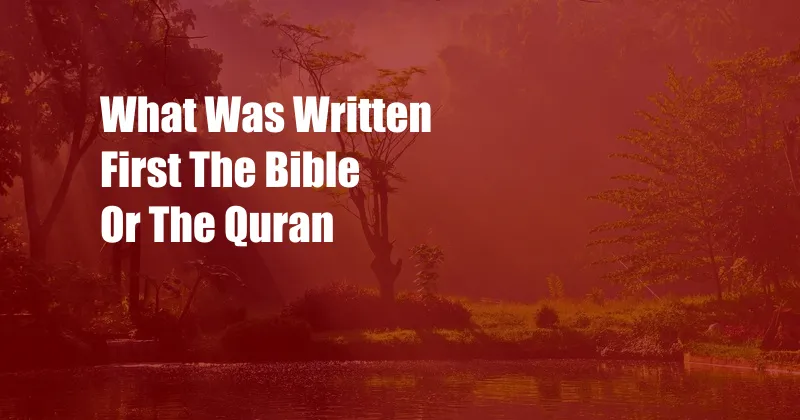
The Great Scriptural Divide: Tracing the Origins of Holy Scriptures
From the depths of human civilization’s earliest days, the written word has served as a conduit for divine revelation and spiritual guidance. The Bible and the Quran, two of the world’s most revered and influential religious texts, have played a pivotal role in shaping the lives and beliefs of billions. Yet, the question of which came first—the Bible or the Quran—has sparked centuries of debate and scholarly inquiry.
Unveiling the origins of these sacred texts takes us on an extraordinary journey through the annals of history, traversing ancient civilizations and witnessing the rise and fall of empires. Let us embark on this enlightening exploration to unravel the chronological tapestry of these profound scriptures.
The Genesis of the Bible
The Bible, a compilation of revered texts held sacred by Jews and Christians, boasts a rich and complex history spanning centuries. Its genesis can be traced back to the Hebrew Bible, also known as the Tanakh, which emerged from the diverse religious traditions of the ancient Israelites.
The Tanakh comprises three distinct sections: the Torah (Law), the Nevi’im (Prophets), and the Ketuvim (Writings). The Torah, the central pillar of the Bible, contains the foundational narratives of creation, the patriarchs, and the Exodus from Egypt. It is believed to have been authored by Moses around the 13th century BCE. The Neviim and Ketuvim sections, compiled over several centuries, encompass historical accounts, prophetic utterances, psalms, and wisdom literature.
The Revelation of the Quran
The Quran, the sacred text of Islam, holds a central position in the faith, revered by Muslims as the verbatim revelation of God through the Prophet Muhammad. Its origins lie in the 7th century CE during Muhammad’s lifetime in Mecca, Saudi Arabia.
The Quran, meaning “recitation” in Arabic, is believed to have been revealed to Muhammad in piecemeal fashion over a period of 23 years, beginning in 610 CE. These revelations were initially preserved through memorization and oral transmission before being compiled into a written form after Muhammad’s death. The Quran is considered the culmination of Allah’s divine revelation to humanity, superseding all previous scriptures.
Chronological Comparison: Unveiling the Sequence
Based on historical and textual evidence, scholars have established that the Bible, in its earliest form as the Hebrew Bible, predates the Quran. The Torah, the foundational text of the Bible, is believed to have been written around the 13th century BCE, while the Quran was revealed in the 7th century CE. This chronological disparity indicates that the Bible existed centuries before the Quran.
It is important to note that the chronological order of these scriptures does not diminish the significance or validity of either text. Both the Bible and the Quran hold deep spiritual and cultural significance for their respective faith communities and continue to inspire and guide countless believers worldwide.
Embracing Diversity in Sacred Texts: A Path to Understanding
The Bible and the Quran, despite their chronological differences, share common threads of spirituality, morality, and the pursuit of a higher purpose. Recognizing the diversity of sacred texts allows for greater understanding, empathy, and interfaith dialogue.
By respecting and appreciating the unique contributions of different religious traditions, we foster a more harmonious and tolerant global community. Embracing the richness of sacred texts empowers us to bridge cultural divides and engage in meaningful conversations about the shared human experience.
Tips for Navigating Interfaith Conversations
1. Approach with Respect and Curiosity:
Engaging in interfaith conversations requires an open mind and a willingness to listen actively. Approach different religious perspectives with respect and curiosity, seeking to understand rather than convert.
2. Use Empathetic Language:
Choose words carefully and avoid using inflammatory or judgmental language. Strive to convey your thoughts with empathy and sensitivity, respecting the beliefs and traditions of others.
3. Focus on Common Ground:
Identify areas of shared values and beliefs to build bridges of understanding. Emphasize the commonalities that unite different faiths, such as the pursuit of a meaningful life, compassion, and social justice.
FAQs on the Chronology of Sacred Texts
Q: Which came first, the Torah or the Quran?
A: The Torah, the foundational text of the Bible, predates the Quran by several centuries. The Torah is believed to have been written around the 13th century BCE, while the Quran was revealed in the 7th century CE.
Q: Why is the chronological order of sacred texts important?
A: Understanding the chronological order of sacred texts helps us appreciate the historical context and the evolution of religious thought. It also enables us to recognize the unique contributions of each tradition to the spiritual landscape of humanity.
Q: Does the chronological order of scriptures diminish the significance of any particular text?
A: No, the chronological order does not diminish the significance or validity of any sacred text. All religious texts hold deep spiritual and cultural importance for their respective faith communities and continue to inspire and guide believers worldwide.
Conclusion: A Tapestry of Divine Revelation
The Bible and the Quran, separated by centuries but united in their spiritual essence, stand as testaments to the human quest for divine connection. Their chronological order reflects the unfolding tapestry of human history and the continuous revelation of God’s message to humanity.
As you ponder the origins of these sacred texts, I invite you to engage further with the topic. Do you find yourself drawn to the historical and textual exploration of religious scriptures? Share your thoughts and insights in the comments section below.